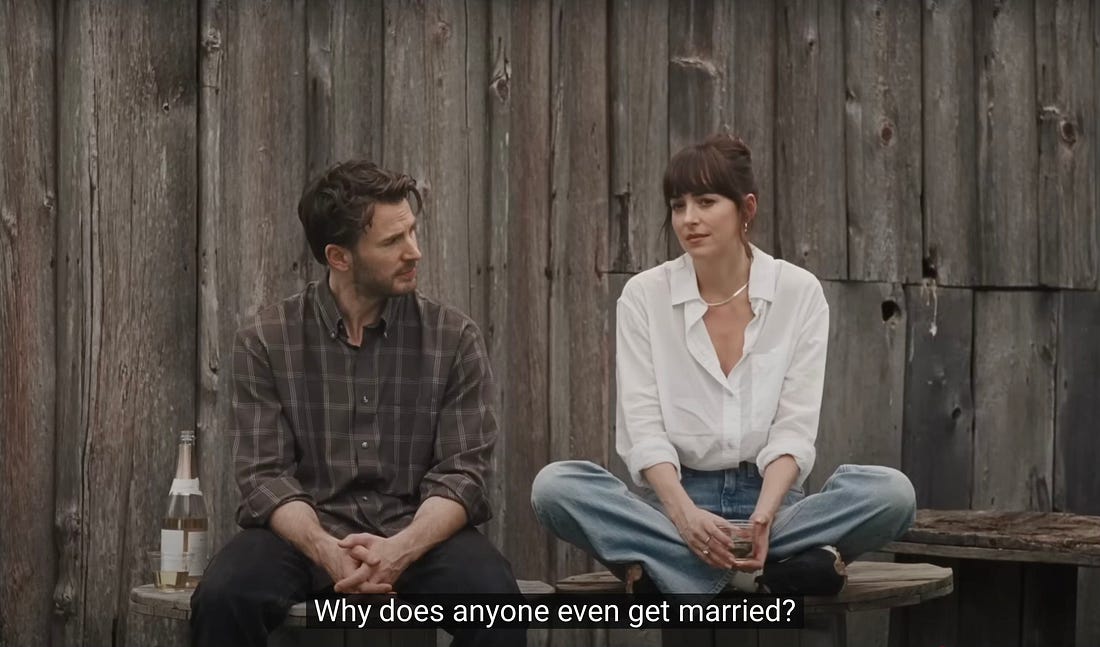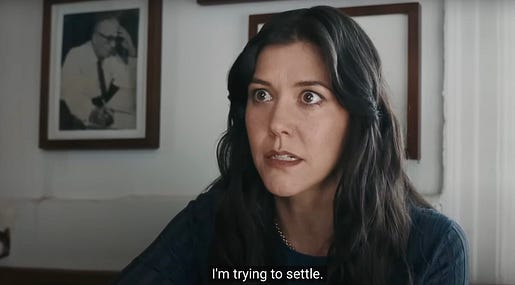A rom-com for the manosphere'Materialists' buys into the romantic conspiracy theories of the misogynistic Red Pill and the cynical dating strategies of the femosphere, before being pulled into the cult of 'true love.'
At times, the script for the hot new rom-com of the summer reads like a Red Pill subreddit come to life. Celine Song’s Materialists—starring Pedro Pascal, Dakota Johnson, and Chris Evans—portrays a hetero dating scene full of shallow and selfish schemers. The women want tall men with money and a full head of hair. The men want hot and fit girls in their twenties. The film is truly awful, I’m sad to report, but I’m less interested here in deconstructing its many failures—chiefly, its emotional emptiness and incoherence—than I am in its gender politics. The film brings to life the conspiracy theories of the manosphere, while also tapping into the calculations of the so-called femosphere, that loose collection of online communities formed in response to misogynistic subcultures like the Red Pill. In the end, though, Materialists is recruited into a different cult: true love. Materialists was written and directed by Celine Song—the Oscar-winning director of Past Lives—who long ago spent some months as a matchmaker. The film’s protagonist, Lucy, played by Johnson, is partly based on her first-hand experience. Lucy is a talented matchmaker at an exclusive firm, and yet she’s perpetually single—in part because she knows too much about the “math” of dating, where people are reduced to their “value” in the romantic and sexual marketplace. Lucy compares her work as a matchmaker to that of a mortician, because human beings are reduced to a series of superficial boxes, left checked or unchecked. She deals in people’s superficial preferences around things like race, height, and salary. When Lucy hears about absolutely brutal and medieval leg-lengthening surgeries that can increase a man’s height by up to six inches, she matter-of-factly observes that it could double a man’s romantic worth. Lucy doesn’t like this reality, but she’s developed a strategy for moving within it—professionally and romantically. She says she’ll either marry rich or die alone. Marriage, she says, is a business deal. Lucy’s clients are just as jaded and calculating, and the movie takes comedic delight in highlighting their faults and absurdities. But Materialists doesn’t just poke fun at the superficiality of swipe-based dating culture. It also portrays a battle of the sexes that pre-dates the apps—one in which youth and beauty are traded for power and wealth. For much of the movie, it’s presented as a widespread and immovable truth. We see women trying to marry rich, and men trying to marry hot. Lucy laments the difficulty of finding a match for a 40something woman named Sophie who is just “OK” attractive. At this point in her life, she would be thrilled to downgrade her expectations. “I’m trying to settle,” she says.
Meanwhile, Lucy herself ends up in a love triangle, stuck between Harry, a handsome and extremely wealthy private-equity guy who she refers to as a “unicorn” (played by Pascal), and her ex-boyfriend John (played by Evans), a 30something broke actor, who she previously split with because he was “poor.” It’s all pretty reminiscent of the manosphere’s universe of brutal terms and calculations. There’s “sexual market value,” or SMV, in which people are said to have a relative value based on their looks and social status. “Looksmaxxing,” including length-lengthening procedures, are discussed on incel forums. Consider, too, “Alpha Fucks/Beta Bucks,” in which women are alleged to sleep with alphas—or “Chads,” the ultimate alphas—and marry beta providers, or “cucks.” And let us not forget the “cock carousel” that women are said to ride during their prime years of fertility and attractiveness, before “hitting the wall” as their looks take a nose-dive and they approach their “expiration date.” (See: desperate-to-settle Sophie.) In the femosphere, you have communities like female dating strategy, where women try a bunch of different strategies—from withholding sex to insisting on men paying for dates—to secure commitment from a “high value man,” or HVM, who are sometimes referred to as “unicorns” (the same term Lucy uses for Harry). There’s also phenomena like “dark feminine” influencers who claim to teach women how to use their seductive powers to manipulate straight men into better behavior in the dating realm (i.e. texting back and not ghosting). Lucy buys into this kind of sexual marketplace theory, while also, curiously and unbelievably, holding out hope for the possibility of true love—at least for her clients, if not for herself. True love just walks into your life, she says. It’s more than checked boxes. You can’t control it. It’s beyond the marketplace. You might say that it saves you from the marketplace. Unlike the struggle and brutality and work of dating, true love is easy and effortless, Lucy believes. Lucy straddles these two contradictory worlds of belief, but, eventually—SPOILER ALERT—she is pushed to choose a side. The chosen mechanism for this turnabout is one of the script’s more troubling aspects. Sophie, one of Lucy’s dating clients, is sexually assaulted by a date—a man that Lucy chose for her. Lucy feels implicated—her work and theories of romance are implicated, too—and she starts to unravel. She decides to hang out on a street corner in a trenchcoat and baseball cap, shakily smoking a cigarette, and waiting for Sophie to pass by so that she can… apologize, I guess? But also so that she can try to understand how her perfect relationship “math” could have failed so horrifically. Another way to put this: she stalks a sexual assault survivor in order to assuage her own guilt and try to recover her relational worldview. Then we learn that Harry, the unicorn played by Pascal, had that value-doubling leg-lengthening procedure. He used to be 5’8, but now he’s six inches taller. “I haven’t struck out since,” he says. In one of the better and most moving scenes in the movie, he stands in front of Lucy and squats to show how he would have measured up to her before, and he’s level with her chin. Lucy breaks up with him—not because of his original height or the procedure, she says, but because she’s realized that she isn’t in true love with him, and that he isn’t in love with her. She’s become disillusioned with her superficial approach to the dating “marketplace” (again, thanks to her client being sexually assaulted). And here, of course, Lucy returns to her broke ex-boyfriend, whom she supposedly sees as a soulmate, although we’re given hardly any real evidence as to why they like each other. Even after renouncing her old ways and abandoning her unicorn, we’re dragged through some tiresome romantic back and forth. He wants to be with her, she’s not so sure, and they both seem pretty jaded about marriage. “Why does anybody even get married?” John asks her within the last 20 minutes of the movie. Lucy answers: “Because people tell them they should, and because they’re lonely, and because they’re hopeful and they want to do it differently than their parents.” It’s only after Sophie, the sexual assault survivor, returns into her life that Lucy’s transformation is complete. Sophie calls Lucy in tears as the man who sexually assaulted her starts buzzing at her front door. After Lucy and John come to her rescue, Sophie gives a tearful speech about how now—after being sexually assaulted and then harassed by her assailant—her standards have been lowered. “I’m going to die alone,” she says. “I’m not asking for a miracle. I just want to love someone. Someone who can’t help but love me back.” Here, it feels like the specter of sexual violence is used as a moral lesson: it could be a lot worse than loving a broke but nice actor who loves you back. It is only then that Lucy chooses love over money. While standing outside of Sophie’s apartment, John offers Lucy what is supposed to be a cute, winking business deal—it’s his “final offer.” He can’t promise her money, he says, but he promises to love her forever and ever, for always. Buuuut he also promises to pick up more shifts as a waiter (i.e. more money). That’s when they kiss. That’s when they have their big romantic moment. In front of Sophie’s apartment. Then they get married! They get married. Finally, Lucy has escaped the realm of cynical romantic schemers! She didn’t just choose love but also marriage (despite having sounded deeply cynical about the endeavor just minutes earlier). That’s the happy ending in which we’re meant to delight: the promise of forever and a trip to City Hall, all facilitated by the clarity provided by the looming threat of sexual violence and dying alone. Never mind that Lucy has escaped the conspiratorial thinking of the manosphere and femospere only to adopt the deluded fantasy of heteronormative marriage, an institution born of an actual and true conspiracy: patriarchy. But this is a big-budget summer rom-com, so naturally a prince rescues a princess—in this case, from a brutal sexual marketplace. Marriage is safety and security, even if your husband is a broke actor. I don’t think the film intentionally uses Sophie as a cautionary tale, but that is the ultimate effect, and let us not forget how she would be seen in manospherean terms. Sophie is the woman “hitting the wall.” She is the woman who wanted too much, fucked too much, and, when she saw her “expiration date” approaching, decided that settling was her best hope. The film makes her suffer—and then uses her suffering as a wake-up call for the protagonist, who promptly comes to her senses and settles down (and, perhaps, also settles). Intentional or not, Materialists can be seen as validating the worldview of the Red Pill. It could have been otherwise. Song’s experiences with matchmaking led to observations that might have been rendered so interestingly. “I learned that the way we talk about dating, which is in numbers—height, weight, income, lifestyle, hairline—directly contradicts what it actually feels like to be in love,” she told W Magazine. “We have to walk into love having completely surrendered. You don't have a way to control it.” That isn’t what the movie shows, though. Instead of surrendering to love, Lucy seems to make a calculated decision. Her previous math was off. Now, it seems that love is simply the best deal on the table. |
četvrtak, 19. lipnja 2025.
A rom-com for the manosphere
Pretplati se na:
Objavi komentare (Atom)
Meet Healthline RD Lindsay!
Including her fave nutrition advice. ͏ ͏ ͏ ͏ ͏ ͏ ͏ ͏ ͏ ...

-
Also: 'Don’t think I’m touching a man anytime soon.’ Post-election, I asked where you're at when it comes to sex, desire, and your b...
-
What you eat for breakfast can affect your weight, metabolism, and energy levels differently if you're a man or woman. Here's why....
-
And nontoxic shampoos we've tried and loved ͏ ͏ ͏ ͏ ͏ ͏ ͏ ͏ ͏ ͏ ͏ ͏ ͏ ...


Nema komentara:
Objavi komentar